The biggest study yet of a cancer vaccine – one that was tested in UAB patients – is meeting with widespread approval as the results appeared Saturday, June 30 in the prestigious medical journal The Lancet.
 |
| Warner Huh, M.D., is one of the authors on the study of the effectiveness of Cervarix. |
An experimental vaccine called Cervarix proved more than 90 percent effective in preventing precancerous lesions shown to be caused by the human papillomavirus, HPV, the virus responsible for most cases of cervical cancer, the study said.
Warner Huh, M.D., a gynecologic oncologist at UAB, is one of the authors on the study. He said the safety and effectiveness of Cervarix was apparent based on the large number of women enrolled in the trial: more than 18,000 from 14 countries including the United States. About 50 UAB patients were part of the Cervarix study group.
Two earlier studies looking at a different HPV vaccine called Gardasil involved about 10,000 and 4,500 women respectively, some of which also included UAB patients. Gardasil, unlike Cervarix, won approval from the FDA and is now available to patients.
The randomized Phase III study on Cervarix comes out of the PATRICIA study, short for papillomavirus trial to prevent cervical cancer n young adults. Huh said since Gardasil is only approved for females age 9 to 26, the Cervarix results show that there is some HPV protection for women up to 45 years of age. Still, Cervarix must earn FDA approval before it’s available outside the study group.
Although neither vaccine prevents all types of HPV – there are as many as a 100 strains of the virus – Cervarix is designed to knock out HPV 16 and HPV 18 infection.
Those two HPV types account for 70 percent or more of cervical cancer cases worldwide. Nationally 3,000 women a year die from cervical cancer and 10,000 are diagnosed.
As important as protecting women from cancer, Huh said there would be a huge benefit in terms of cost and emotional pain by sparing women the diagnosis of a cervical-cell abnormalities or cancer precursor that leads to more tests and maybe surgery.
“This vaccine would have a substantial benefit, not only in reducing the morbidity and mortality related to invasive cervical in women, but reducing some of the morbidity and anxiety associated with the diagnosis and management and treatment of women with precancerous lesions of the cervix,” Huh said.